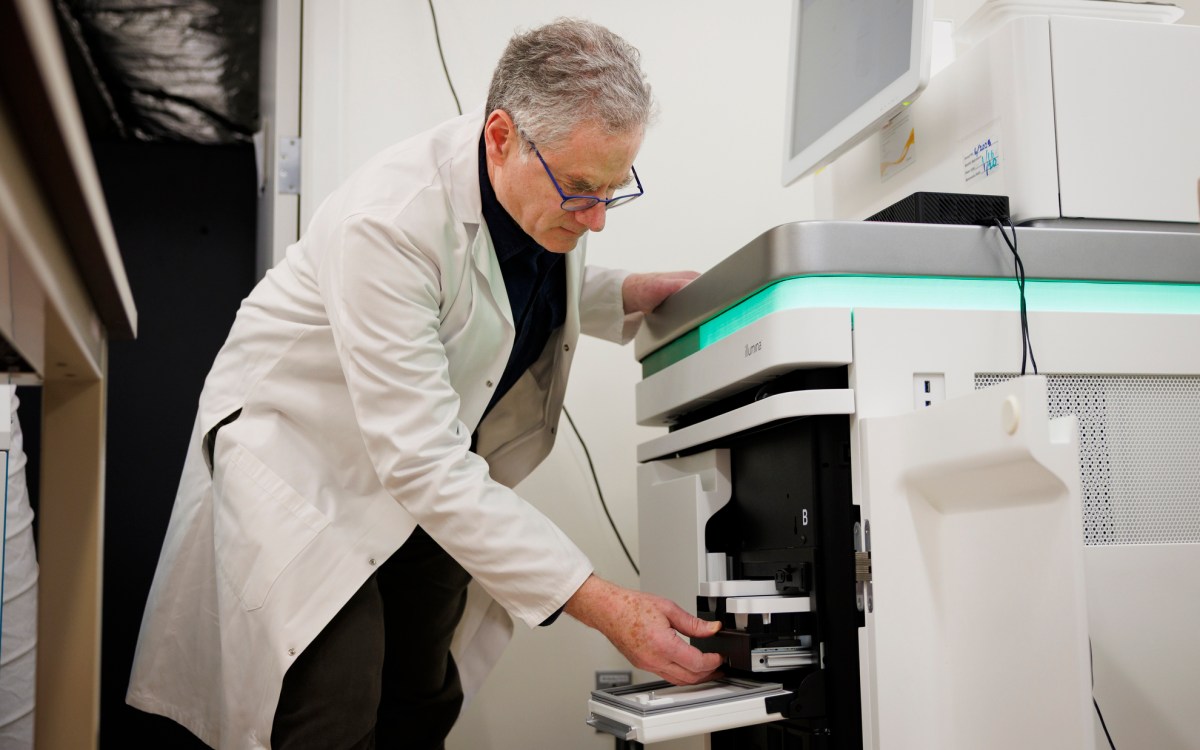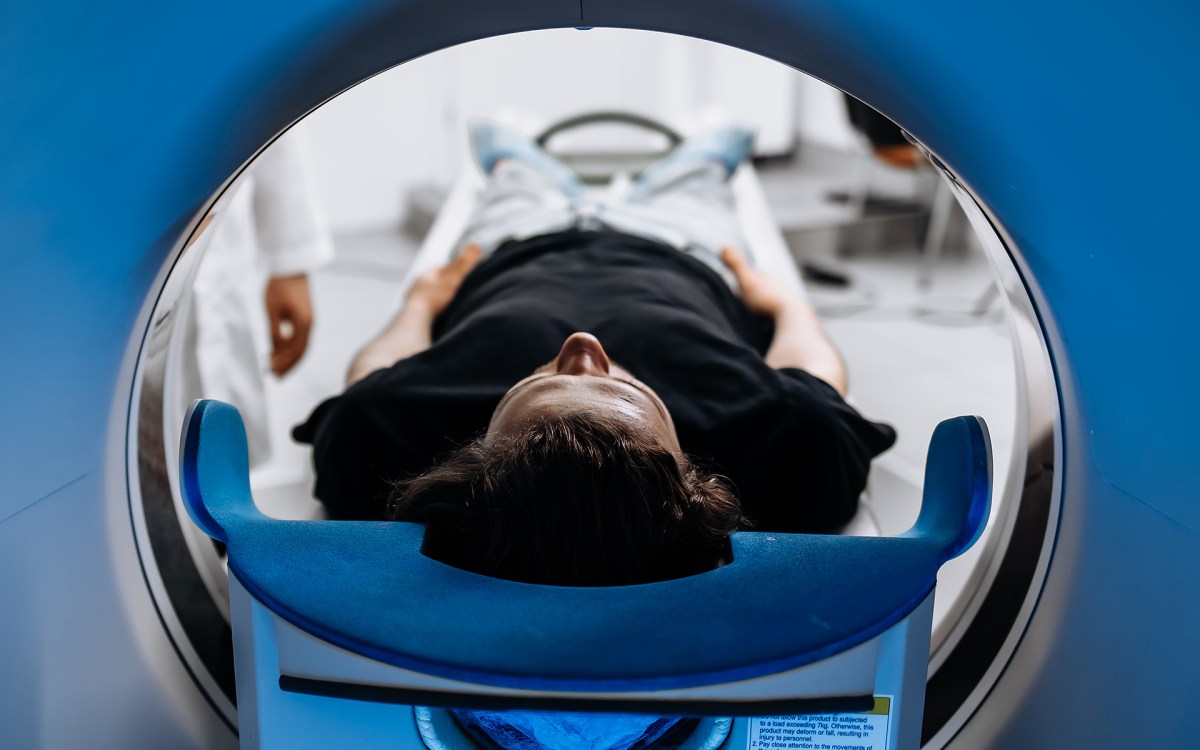Health
-

New AI tool predicts brain age, dementia risk, cancer survival
Unlike other AI models, BrainIAC needs limited data to ID key neurological health indicators

-

It’s time to get more comfortable with talking about dying
Palliative care physicians offer advice for end-of-life conversations between patients, loved ones
-

Turns out inherited eye diseases aren’t a sure thing
Study finds only fraction of those with mutated gene develop malady — a finding that could lead to better treatments (and could apply to other such illnesses)
-

How smoking divides America
Mapping the midlife effects of a lethal habit
-

Americans living longer after cancer diagnosis
Oncologist explains why rising survival rates only tell part of the story
-

Parental firearm injury linked to surge in children’s psychiatric diagnoses
Trauma/post-traumatic stress disorder accounts for most of the increase, according to study

-
Researchers find sleep selectively preserves emotional memories
As poets, songwriters and authors have described, our memories range from misty water-colored recollections to vividly detailed images of the times of our lives. Now, a study led by Harvard…
-
Women in India abused by husbands at far greater risk for HIV infection
In a new study, researchers at the Harvard School of Public Health (HSPH) have found that married Indian women who experienced physical and sexual abuse at the hands of their…
-
A rare glimpse of schizophrenia’s genetic roots
The delusions and hallucinations of schizophrenia can be devastating for the 1% of the population struck by the disease. The condition clearly has a genetic component, evidenced by its tendency…
-
Microsoft gives Partners grant for diabetes home-health program
The Center for Connected Health, a division of Partners HealthCare, one of the nation’s leading integrated health care delivery systems, received funding from the Microsoft HealthVault Be Well Fund to…
-
Growth hormone reduces abdominal fat, cardiovascular risk factors in HIV patients on antiviral therapy
Low-dose growth hormone treatment reduced abdominal fat deposits and improved blood pressure and triglyceride levels in a group of patients with HIV lipodystrophy, a condition involving the redistribution of fat…
-
MGH study shows how amyloid plaques may damage brain cells in Alzheimer’s disease
One of the major unanswered questions surrounding Alzheimer’s disease – whether and how the amyloid plaques found in the brains of patients with the neurodegenerative disorder actually damage neurons – may be closer to an answer.
-
Science in brief
Researchers identify promising cancer drug target in prostate tumors; Scientists find how neural activity spurs blood flow in the brain: Newfound mechanisms could bolster understanding of brain imaging, aging’s effects; World Health Organization creates new surgical tool to make operations safer everywhere; Invasive treatment appears beneficial for men and high-risk women with certain type of acute coronary syndromes; International team identifies 21 new genetic risk factors for Crohn’s disease: Study combines efforts of three research groups, brings total risk sites to 32; Relaxation response can influence expression of stress-related genes: Genomic study finds common biological basis for effects of mind/body practices
-
When threatened, a few African frogs can morph toes into claws
Biologists at Harvard University have determined that some African frogs carry concealed weapons: When threatened, these species puncture their own skin with sharp bones in their toes, using the bones as claws capable of wounding predators.
-
Broad Institute earns grant to support pathbreaking diabetes study
Researchers at the Broad Institute of Harvard and MIT have received a grant to support novel, integrative research aimed at finding ways to encourage the human body to replenish the cells that are missing in type 1 diabetes.
-
Young smokers recruited with menthol, study finds
Researchers at Harvard School of Public Health (HSPH) explored tobacco industry manipulation of menthol levels in specific brands and found a deliberate strategy to recruit and addict young smokers by adjusting menthol to create a milder experience for the firsttime smoker.
-
Genetic mechanisms linked to Parkinson’s disease uncovered
A new genetic finding from a group of researchers at Brigham and Women’s Hospital (BWH), the University of Wisconsin School of Medicine and Public Health (SMPH), and the University of Ottawa may help pave the way for the discovery of therapies that could effectively treat Parkinson’s disease (PD).
-
Across species, genes evolve to minimize protein production errors
Scientists at Harvard University and the University of Texas, Austin, have found that genetic evolution is strongly shaped by genes’ efforts to prevent or tolerate errors in protein production.
-
GlaxoSmithKline and Harvard Stem Cell Institute announce major collaboration agreement
GlaxoSmithKline (GSK) and the Harvard Stem Cell Institute (HSCI) today announced that they have entered into a five-year, $25 million-plus collaborative agreement to build a unique alliance in stem cell…
-
BWH Asthma Research Center Awarded $2 Million Grant for Gene-based Clinical Trial; participants sought from Partners’ Network
The Brigham and Women’s Hospital Asthma Research Center (ARC) has received a $2 million Genetics Enters Medicine (GEM) grant from Partners to study the influence of one’s genetic profile on…
-
Tobacco industry used cigarette menthol to recruit new adolescents and young adult smokers
Researchers at Harvard School of Public Health (HSPH) have found that tobacco companies have deliberately adjusted menthol levels in cigarettes to recruit and addict young smokers by creating a milder…
-
Amy Wagers – focusing on stem cell biology
Twenty minutes after her weekly lab meeting is scheduled to begin, Amy Wagers rushes into a conference room on the fourth floor of the Joslin Diabetes Center, where her lab…
-
Stem cells used to treat muscular dystrophy in mice
Harvard Stem Cell Institute researchers at the Joslin Diabetes Center have for the first time demonstrated that transplanted muscle stem cells can both improve muscle function in mice with a…
-
Middle Eastern families yield intriguing clues to autism
Research involving large Middle Eastern families, sophisticated genetic analysis and groundbreaking neuroscience has implicated a half-dozen new genes in autism. More importantly, it strongly supports the emerging idea that autism…
-
Scientists use genomic tools to create maps of DNA methylation
Much of the field of stem cell biology and development remains uncharted territory. Just as famous explorers and astronomers mapped out landmasses and constellations, researchers are working fervently to chart…
-
Researchers identify promising cancer drug target in prostate tumors
Scientists at Dana-Farber Cancer Institute report they have blocked the development of prostate tumors in cancer-prone mice by knocking out a molecular unit they describe as a “powerhouse” that drives…
-
New source of heart stem cells discovered
Harvard Stem Cell Institute(HSCI) researchers at Children’s Hospital Boston are continuing to document the heart’s earliest origins. Now, they have pinpointed a new, previously unrecognized group of stem cells that…
-
Previously unknown regulator of fat and cholesterol production discovered in mice
Researchers have discovered an unknown regulator of fat and cholesterol production in the liver of mice, a significant finding that could eventually lead to new therapies for lowering unhealthy blood…
-
Boning up on frogs’ defenses
Harvard biologists have determined that some African frogs carry concealed weapons: when threatened, these species puncture their own skin with sharp bones in their toes, using the bones as claws…
-
Scientists isolate a toxic key to Alzheimer’s disease in human brains
Scientists have long questioned whether the abundant amounts of amyloid plaques found in the brains of patients with Alzheimer’s actually caused the neurological disease or were a by-product of its…
-
Research in brief
BLACKS, HISPANICS LESS LIKELY TO GET FOLLOW-UP RADIATION THERAPY, BLACKS MORE LIKELY TO CHOOSE AGGRESSIVE CARE AT END OF LIFE
-
Aquatic genome captures foreign DNA
Long viewed as straitlaced spinsters, sexless freshwater invertebrate animals known as bdelloid rotifers may actually be far more promiscuous than anyone had imagined: Scientists at Harvard University have found that the genomes of these common creatures are chock-full of DNA from plants, fungi, bacteria, and animals.
-
Protective mechanism fails when obesity sets in
Reporting in the journal Cell Metabolism, researchers from the Harvard School of Public Health (HSPH) said they have shown for the first time that fat-storing cells, or adipocytes, contain a protective anti-inflammatory immune mechanism that prevents the cells from overreacting to inflammation-causing stimuli, such as fatty acids in the diet.
-
Cluzel named professor of molecular and cellular biology, applied physics
Philippe Cluzel has been appointed professor of molecular and cellular biology and Gordon McKay Professor of Applied Physics in Harvard University’s Faculty of Arts and Sciences (FAS) and School of Engineering and Applied Sciences, effective July 1.
-
New report finds low vitamin D levels appear common in ‘healthy’ children
Many infants and toddlers may have low levels of vitamin D, and about one-third of those appear to have some evidence of reduced bone mineral content on X-rays, according to a report in the June issue of Archives of Pediatrics & Adolescent Medicine, one of the JAMA/Archives journals.
-
Video game technology may help surgeons
In a study funded by the National Institutes of Health (NIH) featured on the cover of this month’s Journal of Thoracic and Cardiovascular Surgery, cardiac surgeons from Children’s Hospital Boston report good results with a simple technology borrowed from the gaming industry: stereo glasses.


